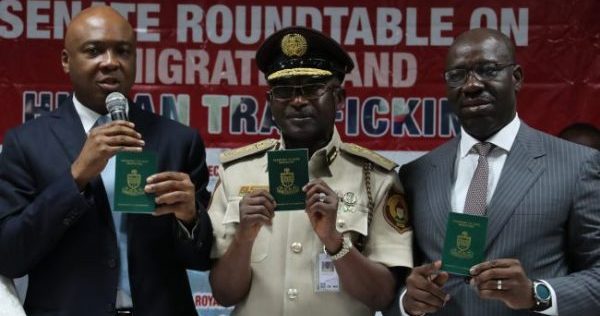Metro
Saraki decries rate of illegal migration in Nigeria

Senate President Bukola Saraki has decried the level of human trafficking in Nigeria and the rate citizens of the country Illegally migrate to other countries of the world.
Saraki, noting that the issue has become a bane on Nigeria’s existence as a nation, lamented that Nigeria accounts for the world’s highest number of irregular migrants going through the Agadez Route.
He stated this in his keynote address at the Senate Roundtable on Migration and Human Trafficking in Nigeria, held in Benin City, Edo State capital.
Other stakeholders at the event included, Governor of Edo State, Godwin Obaseki Minister of Interior, Abduraman Dambazzau, the European Union (EU), United Kingdom, International Organization on Migration, the National Agency for the Prohibition on Trafficking in Persons (NAPTIP) and Civil Society Organizations.
The two-day event which started on Monday, was sequel to the worrisome stories of number of Nigerians migrating through other countries, with many of them dying in the process while several others suffer all kinds of dehumanisating treatment.
The Federal Government has aided the deportation of hundreds of Nigerians following reports that many of them are either being sold into slavery or gruesomely murdered.
Speaking on the vexed issue, Saraki said, “The theme centres on Irregular Migration – which some refer to as Illegal Migration – and Human Trafficking; two issues that have become a bane of our existence as a nation.
“Nigeria currently ranks 23 on the Global Slavery Index of 167 countries with the highest number of slaves. Human trafficking is third in the ignoble hierarchy of the commonly occurring crimes in Nigeria, according to UNESCO.
“Irregular migration has been a disastrous development for our continent; and the stark realisation becomes even more so, when we narrow the focus to Nigeria – which accounts for the world’s highest number of irregular migrants going through the Agadez Route. Our citizens represent the fifth largest number of migrants crossing the Mediterranean Sea into Europe; and the number of females arriving in Italy alone increased 600-fold in just three years.
“And what of those who perish along the way – who are sucked into the void between the desert and the raging sea and are never seen again? 10,000 Nigerians are estimated to have lost their lives on the perilous journey in five months of last year alone. We have seen the bleak images of coffins of 26 Nigerian girls who were laid to rest in Italy last November. And while media attention is often focused on those rescued at sea or washed up along Europe’s shores, United Nations’ estimates suggest that more migrants die crossing the Sahara than the Mediterranean. This is human tragedy on a colossal scale, and to reel off the statistics is to recite a litany to doomed youth.”
Saraki therefore called on the summit to help identify “how legislation, which is the primary function of the National Assembly and policy, a joint responsibility can be brought to bear in addressing the problem.”
While noting that irregular migration of Africans to faraway countries, especially in the Western hemisphere is not new, the Senate President however, regretted that it has assumed a much more worrying dimension in recent times.
READ ALSO : We’ll go to any length to rescue Dapchi schoolgirls, others —Buhari
“And Nigerians seem to lead the ignominious pack. Of asylum applications rejected by European countries since 2011, Nigerians accounted for nearly 100,000 – almost three times the number of any other African country.
“Even more alarming is the spectre of human trafficking – and worst of all, the enslavement of Africans, including Nigerians, in some countries,” he said.
He added, “This roundtable is designed to help answer some of the niggling questions. To identify root causes and the various dimensions of the problem, as well as areas where legislation and policy can be used in the short term – to stem the outward flow of our people; and – in the long term – to see how Nigeria and the rest of the world can collaborate to reduce the damage to national economies, societies and the global economy.”
RipplesNigeria… without borders, without fears
Click here to join the Ripples Nigeria WhatsApp group for latest updates.
Join the conversation
Support Ripples Nigeria, hold up solutions journalism
Balanced, fearless journalism driven by data comes at huge financial costs.
As a media platform, we hold leadership accountable and will not trade the right to press freedom and free speech for a piece of cake.
If you like what we do, and are ready to uphold solutions journalism, kindly donate to the Ripples Nigeria cause.
Your support would help to ensure that citizens and institutions continue to have free access to credible and reliable information for societal development.


















